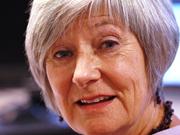Women’s right to literacy

When women are educated and empowered, the whole of society benefits:
“…educated women are more likely to use health clinics and return to the clinic if their children’s health does not improve;
educated women tend to begin their families at a later age and have fewer, healthier children;
a 1 percent rise in women’s literacy is 3 times more likely to reduce deaths in children than a 1 percent rise in the number of doctors (based on a study of 46 countries by the UN); and
for women, 4 to 6 years of education led to a 20 percent drop in infant deaths.”
The evidence of the impact of educating women, in developing countries, is clear but the statistics tell a story of neglect and a scarcity of policies and programmes by national governments as well as donor nations and organisations.
514 million women throughout the world are illiterate; many are unable to access effective educational programmes.
In 41 countries, women are twice as likely as men to be illiterate.
Of the 115 million children out of school, the majority are girls.
These numbers only give partial insight into the problem. They do not describe the loss of individual potential to contribute to communities and public life, to support their children and run their enterprises.
Literate women support and keep their children in school, acting as strong role models for their daughters and grand-daughters. An OECD report (2012) indicates how parental involvement in education is pivotal for the success of children, not only in school but beyond.
Policies which support family learning and intergenerational learning have been proved to be effective for both women and their children.
Many women are agriculturalists; literacy helps them to optimise their knowledge of how to deal with crop diseases and climate challenges as well as trade efficiently and competitively.
Women are often prioritised over men as managers of micro-finance loans. Learning the relevant literacy and numeracy empowers them to build on their organisation and management skills to keep their accounts effectively.
Women are increasingly taking part in public life through representation on school or community councils. Studies demonstrate that by developing their literacy, their effective contributions are increased and the impact of such democratic processes enhanced.
The puzzling part of this picture is the paucity of international and national policies and programmes. The majority of the work with women’s literacy is undertaken in an ad hoc way, led predominantly by NGOs who often expend as much energy and effort in trying to find funds as they do on delivering programmes. No strategic direction, from either governments or international donor organisations, leads to vulnerable provision which comes and goes.
The Literacy Working Group, a small voluntary group, associated with the Global Campaign for Education, of dedicated individuals and representatives of key organisations and institutions, has joined with the National Institute of Adult Continuing Education. To mark International Literacy Day, we have produced a document, called, Women’s Right to Literacy. It urges individuals and organisations to respond with evidence and experience to support the arguments and make a difference for women all over the world.
The calls for action urge governments and international organisations and agencies to:
- develop strategies for improving women’s access to learning literacy and numeracy, through financial and technical support and policy development;
- provide technical and resource support to developing countries to increase their work in family and intergenerational learning;
- offer technical assistance to strategies which integrate women’s literacy in vocational skills training, as well as in health services, information and training; and
- ensure that both initial and in-service teacher-training programmes include the development of teachers’ own literacy.
Using a small percentage of international development budgets, combined with commitment from the governments of developing countries, to better educate women and teachers is a call for intelligent, evidence-based policies.
Mark International Literacy Day by using your right to literacy and help millions of women to do the same.
Jan Eldred is chair of the Literacy Working Group and a senior research fellow at the National Institute of Adult Continuing Education (NIACE)






Responses